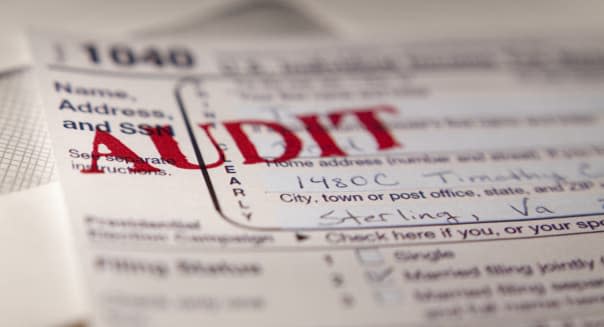Audit Insurance: Here's Why You Probably Don't Need It

Few things scare Americans more than the thought of facing a tax audit. According to the Internal Revenue Service's Oversight Board's 2013 Taxpayer Attitude Survey, only the sense of personal integrity was a more important reason than fear of an audit in explaining why so many Americans are honest about paying their taxes. In fact, many taxpayers choose not to take benefits to which they're legally entitled -- simply because they think it would increase their chances of getting audited.
In order to give scared taxpayers peace of mind, some tax preparation companies have introduced audit insurance products. But with the odds of an audit so low, does it make sense to pay even a small amount to protect you from the expenses involved in an IRS audit? Let's take a closer look.
Staying Off the Defensive
Intuit (INTU) is well-known for TurboTax, which millions of taxpayers use every year to prepare their returns. Through a partnership with TaxResources, Intuit offers an audit insurance program known as Audit Defense. According to Intuit, TaxResources will defend your return from audits for up to seven years through the highest available level of appeal. Audit Defense also schedules all audit appointments and handles correspondence and document review for the IRS.
The cost depends on the level of service you choose. For a single year's return, the service $39.99. But for $195 annually, TaxResources will give you audit defense for all years that are still available to be audited, additional tax hotline availability and a review of your federal return each year.
Prices vary widely. Tax Audit Defense changes $100-$150 a year for similar service. Tax Audit charges $50, $175 or $295, depending on tier level.
Obviously, as with any type of insurance, you'd need to have bought it before you find out you're getting audited. But whether or not the coverage is worth the cost depends on the complexity of your return and how much you're willing to pay to get help should the IRS come knocking.
How Likely Is an Audit?
First and foremost, recognize that audit defense doesn't prevent an audit. It only tries to make it easier for you to handle by giving you access to professionals at no additional charge if you need them. If you choose a service that offers return review, then the service might identify potential audit issues and thus help you reduce your risk.
%VIRTUAL-article-sponsoredlinks%You have to weigh the cost of audit insurance against your risk of getting audited, plus the potential additional taxes you might have to pay in case of an audit. IRS figures show that only about 1 percent of individual taxpayers got audited in 2013. Those figures are even lower for middle-class taxpayers with incomes in the $25,000 to $75,000 range, with audit rates picking up substantially only after you make $200,000 or more. Even among those with incomes between $1 million and $5 million, the chances of getting audited are only around 10 percent.
How much extra you might owe in an audit depends on how complex your return is. If you have a very basic return that includes only wage income and a standard deduction, then an audit is very unlikely, and even if you did get audited, it wouldn't be hard to justify your numbers on your own. But if you take many types of unusual deductions, have extensive investments, or own your own business, then the complexity level rises substantially, and the risk of getting something wrong and facing an audit gets a lot higher.
Do a Background Check
For many, the fear of getting audited is much worse than the actual chance of it happening. So for most taxpayers, audit insurance isn't worth the price unless you really want to be sure you'll have someone on your side without paying fees to an accountant or other professional.
If you decide audit insurance is right for you, make sure you look at reviews of service providers before you make a final choice. Sometimes, what the promotional materials suggest you'll get from the service provider is different from what past purchasers have received. Given that the odds are so low of getting audited, you want to be absolutely sure that you get every bit of protection you're paying for if you end up drawing the short straw.
You can follow Motley Fool contributor Dan Caplinger on Twitter @DanCaplinger or on Google Plus. He doesn't own a position in any stocks mentioned. The Motley Fool recommends Intuit. The Motley Fool owns shares of Intuit.

